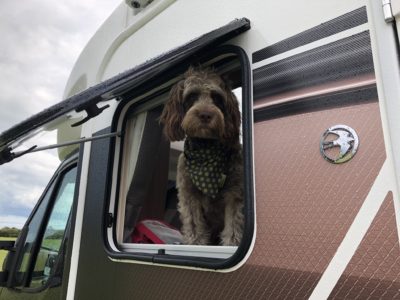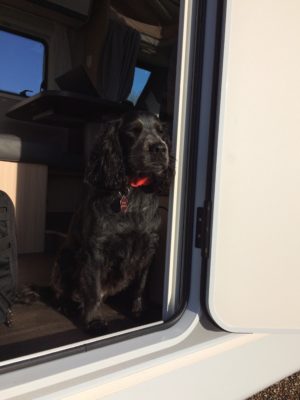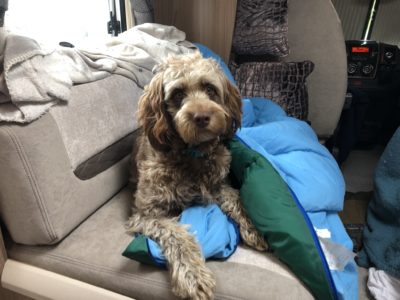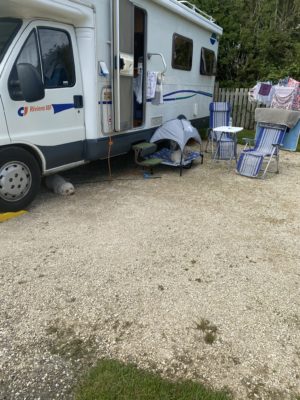What better way to enjoy your caravan or motorhome holiday than with a furry companion? We know many of you like to take your pets caravanning or motorhoming and with many pet- friendly campsites across the UK they can have just as much fun as us!

Here, we bring you some tips for taking dogs and cats on tour.
Travelling with dogs
It’s now law in the UK that dogs and other travelling animals are suitably restrained in either the towing vehicle or motorhome. Specially designed short leads clip into a seat belt on one end and onto a dog harness at the other, or dogs can travel in a crate.
When travelling with a dog make sure you take a water bowl, some water and stop frequently. It’s probably best to stop every two-and-a-half hours at a designated service station to allow the dog to stretch their legs and have a comfort break too. Obviously, older dogs might need more frequent comfort breaks.
Once you arrive on site and when setting up your caravan or motorhome it’s a good time to set up the dog lead too. A long (non-extendable) lead can be looped around the jockey-wheel for caravans, or through an alloy wheel for motorhomes. Or dog lead attachment points, such as metal spikes, can be inserted into the ground. Whichever attachment point you use, make sure you allow your dog to have some freedom to move around your unit but not too far to become a nuisance to other pitches and site users.
Dogs on campsites
When on site there are just a few rules of etiquette, that are no different from keeping a dog at home. Try to keep barking to a minimum, make sure you always clean up any mess, and try to encourage the dog to “go” in a designated dog exercise area. These areas allow you to take the dog off the lead too, as keeping a dog on a lead throughout the rest of the campsite will be necessary.
Also, make sure your dog doesn’t roam onto other people’s pitches.

Don’t leave your dog unattended in your caravan or motorhome for long periods of time. There will be times when they’ll need to be left for a short time, such as going to the shops, using the on-site facilities, or for other short periods. In these instances, use some common sense.
If it’s a warm day, don’t leave dogs alone. A caravan or motorhome will become quite hot, even on a mild day with skylights open and window blinds closed. Also, if your dog gets easily distressed, keeping a dog alone in a leisure vehicle with unfamiliar surroundings and smells can cause a dog to bark and become quite anxious. If you do need to leave your dog for a short time then close the blinds, put the radio on, and make sure they have a bowl of water and are settled.
A top tip for feeding your dog, especially if it eats dry food is to create separate meal packs, using sandwich bags to hold each meal. Or measure out meal portions into a container so you only need to take the exact amount of food for your dog. Prepare these before you head off and store them away in your leisure vehicle.
Dog accessories when touring
Don’t forget to take their bed from home and a few favourite toys and blankets that have a familiar scent on them, as well as towels for those wet walks or a swim in the sea, and not forgetting the all-essential poo bags!

Other useful accessories for holidaying with dogs include pup tents and dog beds – some come with detachable canopy shades, which are useful at the beach or park to give your dog some shade on hot sunny days.

There are plenty of collapsible water bowls which you can either clip onto a bag or carry with you to fill up with water on days out so your dog stays hydrated. Poop bag holders are useful in locations where doggy bins are not readily available.
Pet accessories for the touring vehicle include portable showers to clean down a muddy dog and very large microfibre towels to dry off a wet pup too, or even a dog “drying bag” and Paw Buddy for cleaning muddy paws before they step into your ‘van.
In the summer months, cooling mats offer a dog a cool bed to lay down on and cool off. Finally, windbreaks can create an enclosed space for your dog to roam off lead.

Windbreak manufacturers like Isabella also have gates that can be installed to help create a secure enclosure, plus an awning will provide a great place for your dog to relax.
Don’t forget to check your dog regularly for fleas and ticks, particularly if they love running through long grass, paying particular attention to their neck, ears and around their tummy. Regular flea, tick and worming treatment will also help keep things at bay.
Caravanning and motorhoming with cats
Unlike most dogs, cats can be easily scared and can often suffer from anxiety, as they don’t like change. Caravanner Dan Trudgian often takes their cat Smudge on holiday and shares his tips for taking a cat away in a caravan or motorhome.
The first step is to get your cat familiar and relaxed with the tow car or motorhome. Start by sitting in the car with the cat on the drive, with the engine off and no radio, allowing the cat to roam free and sniff out the interior.
After doing this a few times, take short journeys with the cat to get them used to travelling. Once the cat is happy in the tow car, the next step is to get them familiar with the caravan.
Let them spend a few hours in the caravan whilst in storage and take things like a blanket they like to sleep on and a few toys that have their scent on.
When on site and you’re pitched up and settled, set up your kitty litter tray in the shower. For dry food, pre-measure amounts suitable for each meal time so you’re limiting the amount of food you need to carry.
Try to keep pets cool in warm weather by opening windows and skylights and use fly screens to limit the bright sun. If you have blown air heating turn the setting to vent only, to create air circulation around the caravan.
One of the biggest fears of taking your cat on holiday is the risk of the cat escaping through an open door or window. Make sure the cat always has a collar with a tag, and whenever a door or window is open, use fly screens as much as you can. If you don’t have fly screens, use a harness and a lead to reduce the risk of the cat escaping.
Make sure you give the cat some space and let them do what they want to do (within reason) and use your own judgement if taking the cat is going to be possible as your cat might not take to touring life.
Cat accessories when touring
Our top pick of cat accessories includes a harness that can be easily clipped on; non-clumping silica gel kitty litter; doggie poop bags for cleaning up any mess; collapsible and resealable food bowls; a comfy bed that can use a cooling mat and Feliway plug-in diffuser to release a calming scent for the cat.
Travelling to Europe with pets
If you want to take your dog, cat or even ferret to Europe, as well as making sure you have a valid passport, healthcare and travel insurance, plus a GB sticker for your leisure vehicle and a Green Card, there are a few steps to complete to make sure your pet can travel.
Start to prepare at least one month before your travel date by visiting your vet to get your cat, dog or ferret microchipped. Make sure your pet’s rabies vaccination is up to date and get an animal health certificate signed by an official vet.
If travelling to Finland, Ireland, Northern Ireland or Malta, then dogs will need to have tapeworm treatment.
On arrival in the EU you will need to enter through a designated travellers’ point of entry with your pet and you might need to prove that you have taken all the previous steps and present your pet’s health certificate.
Also, be aware that there are restrictions on the food you can carry into the EU. You cannot take meat, milk or products containing them into EU countries other than special pet food needed for medical reasons. So it’s best to plan ahead and find out where you will be able to buy suitable pet food for your dog or cat.
It’s also worth finding out where the nearest vets are to where you are staying in case of any issues when you’re touring.
Will my pet cope with travelling?
Whether your pet is suitable for travelling is up to you to decide as you know your pet better than anyone and you’ll understand what they need and how they behave in specific situations.

If you want more advice and from somebody qualified to know more about pets, travel and holidays, speak to your local vet or even the RSPCA.
Insurance considerations
Caravan and motorhome insurance policies don’t tend to cover loss or damage caused by pets – that could be chewing, scratching, tearing or fouling of the caravan’s furnishings, so even more of a reason to make sure your pet is calm and has toys and chews for entertainment whilst in the ‘van.
Over to you…
Got any top tips for caravanning and motorhoming with pets that you’d like to share. Feel free to add your comments in the box below.


Cat or dog, consider fitting him/her/them with a GPS tracker if you have any concerns about them going walkabout – especially abroad.
My 2 border collies travel all over the country with us; are well trained sociable dogs with excellent recall but I still use a tracker.
Best (in my opinion) is Pawfit 3 at a cost of about £55 + around £100 (per animal) for a 2-year subscription. Great! – other brands available. Nearly 50 years ago we spent 6 months travelling all over the country – 25K miles – with 2 cats & a 12 month old baby. Cats jumped out when we pitched up, enjoyed the stay & were back ready to move on. Never had any problems!!
Great idea Tim. Thanks for sharing
What chance have we got to take our dogs abroad – can’t take their usual wet food or any meat products – vets bills – of course our dogs come on holiday with us and are seen by our vets regularly. Our dog meals are sealed luckily they also have dried food too but let’s hope if we ever manage to travel to Spain or Portugal again they stock our girls wet food
Surely some sort of negotiation needs to be done so that we can take our pet’s usual food with us on holiday! Also the ridiculous requirement for a health certificate needs to be addressed. British pets are among the healthiest in Europe and yet we are required to get a vet to certify this. Crazy!
UK Pet Passports are no longer valid for travel to Europe. You’ll need to obtain an Animal Health Certificate from your vet for each animal within 10 days of travel. Our vet charged £175 for an AHC for our labrador! It’s only valid for one trip but is valid for up to four months for the return trip. Hope this helps.
Thanks Les. We do mention the need to obtain an Animal Health Certificate from your vet.
We have 2 very small dogs, and to keep them safe on site we bought a dog playpen. It folds very flat, opens and folds in minutes, and has a zipped in top and base, and 2 zipped sides you can open for access. They dont have to be tethered in this, and can play with toys and have a non spill water bowl in it.
Also, I take my pop up laundry basket, it has no holes in it, and makes an excellent paddle pool for them in this hot weather, but sometimes I cheat them and use for my feet, ahhh, bliss!
Great article. As a regular caravaner with my collies, when using a windbreak garden don’t forget that they will escape under caravan so put a full skirt on and secure with tent pegs.
That’s a great tip Linda. Thanks for sharing and your feedback
We recently stayed on a Club site as usual with our dog and to our dismay discovered a cat in our awning. The same cat was found the next day under the wardens caravan and in a field. When the owners who were caravanners were asked by the wardens to tether their cat they responded that they could not!
Be careful taking a cat. I took mine for the first time, she was fine first couple of hours in caravan and sat on my knee when I fastened her harness and lead, then in an instant she jumped off and pulled the lead out of my grasp. She disappeared for ten days, fortunately we are on a seasonal pitch so could search regularly. Usually my cat never wanders, not even out of my garden. As she escaped still wearing her harness and lead I feared the worst that she was caught somewhere. Amazingly she was still wearing them when she was found by a lady from a small cat rescue group who used remote cameras and traps to find her. Needless to say I won’t risk taking her again, it’s not worth the stress to both me and my cat who was quite distressed for a few days after being found.
Sorry to hear about that Jennifer. As we say in the article, you know your pet better than anyone, and will be able to decide if they will be able to cope with travelling and a different environment.
Excellent article….very helpful for people unused to holidaying with their pet.